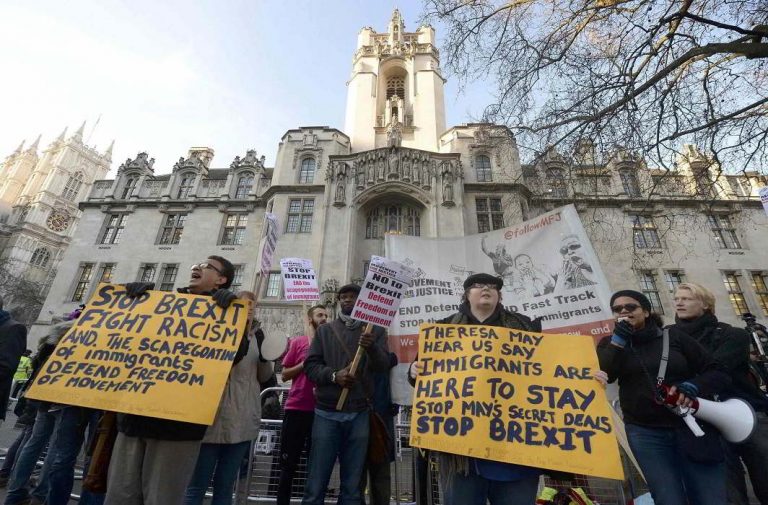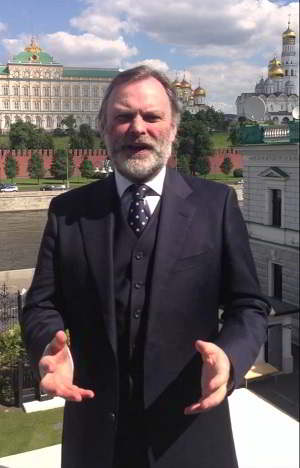
The dramatic resignation of UK’s permanent representative to Europe, Sir Ivan Rogers, has brought to the fore the fault lines between Brexiteers and Remainers
~By Sajeda Momin in London
The British diplomat who was photographed happily holding Prime Minister Theresa May’s handbag while she dealt with journalists in Brussels last October, has flatly refused to carry her Brexit baggage any further. Sir Ivan Rogers, the UK’s permanent representative to Europe who resigned in a dramatic manner at the beginning of 2017 is the latest victim of the Brexit tussle. His sudden resignation has thrown up once again the fault lines between the Brexiteers and the Remainers along with allegations of an attempt to politicise the British civil service in a way that has never been done before.
Britain’s exit from the European Union (EU) had divided the country right from the start—from the acrimonious campaign leading up to the referendum in June 2016 and even after the shocking results for Brexit. Its shadow has also managed to fall on the British civil service which has always prided itself on being politically neutral as it helps the government of the day run the country efficiently.
A veteran civil servant whose previous appointments include principal private secretary to Labour Prime Minister Tony Blair and Europe adviser to former Conservative Prime Minister David Cameron, Sir Ivan’s exit is seen as a huge loss to the Brexit talks which are expected to start as early as April. His depth of experience would have been a tremendous asset for what is considered to be the most complicated negotiations Britain will have to engage in since World War II.
Sir Ivan was appointed as EU ambassador by Cameron in 2013, long before the Brexit referendum and his term was due to come to an end in October 2017, after May triggered Article 50 at the end of March this year as she has promised to do. However, tensions between No. 10 Downing Street and the diplomat had risen after a confidential memo he had written to ministers warning that a trade deal between the UK and EU could take at least 10 years to finalise, had been leaked to the press in December last year. Brexiteers and May have been confident that they would have all the deals tied up in two years. He had also given his blunt advice to the government about the pitfalls that await Britain as it tries to negotiate its way out of a very complex diplomatic task.
Britain’s exit from the European Union (EU) had divided the country right from the start—from the acrimonious campaign leading up to the referendum in June 2016 and even after the shocking results for Brexit. Its shadow has also managed to fall on the British civil service which has always prided itself on being politically neutral as it helps the government of the day run the country efficiently.
Many prominent Eurosceptics in the Conservative Party were quick to accuse him of being overly “pessimistic” and someone who “did not really have his heart” in the process and hence found it “very difficult and long-winded”. Iain Duncan Smith, erstwhile leader of the Conservative Party and former cabinet minister, went so far as to say that when a civil servant “starts going public”, ministers “can no longer trust that individual”, accusing Sir Ivan of deliberately leaking his memo.
For a career bureaucrat who considered himself apolitical, to have a slur, no matter how faint, that he was favouring one side over another made it very uncomfortable to continue. “If the reports are true that he has been hounded out by hostile Brexiteers in government, it counts as a spectacular own goal,” said Nick Clegg, former Liberal Democrat leader, who had once worked with Sir Ivan in Brussels and described his resignation as a “body blow to the government’s Brexit plans”. Sir Ivan also received support from Remainers in the Conservative Party like former Chancellor of the Exchequer George Osborne who praised him as a “perceptive, pragmatic and patriotic public servant”. However, it was not enough to stop the EU ambassador from leaving, but not without firing some veiled salvos at the May government first.
” font_container=”tag:p|font_size:20px|text_align:left|color:%23000000″ google_fonts=”font_family:Open%20Sans%3A300%2C300italic%2Cregular%2Citalic%2C600%2C600italic%2C700%2C700italic%2C800%2C800italic|font_style:700%20bold%20regular%3A700%3Anormal”]
In his long farewell email to his staff in Brussels, Sir Ivan accused the May government of still not knowing what would be the “negotiating objectives for the UK’s relationship with the EU after exit”, when talks could begin. He suggested that there was a danger of the UK being outclassed in the Brexit talks by the EU because “serious multilateral negotiating experience is in short supply in Whitehall, and that is not the case in the Commission or in the Council”. The Treasury’s former top civil servant and now a peer, Lord Macpherson, agreed with Sir Ivan and said that his departure made matters worse as it marked a “willful and total destruction” of EU expertise within Whitehall.
Senior ministers, who will decide on our positions issue by issue, also need from you detailed, unvarnished—even where this is uncomfortable—and nuanced understanding of the views, interests and incentives of the other 27.
—Sir Ivan Rogers in his farewell note to colleagues
Sir Ivan goes on to say that it is only civil servants who can provide a true picture of the complexities ahead. “Senior ministers, who will decide on our positions issue by issue, also need from you detailed, unvarnished – even where this is uncomfortable – and nuanced understanding of the views, interests and incentives of the other 27,” he writes. He goes on to tell his junior colleagues to “never be afraid to speak the truth to those in power” and to continually “challenge ill-founded arguments and muddled thinking”, implying that ministers are unwilling to listen to the advice of civil servants and gives a strong hint that British mandarins in the EU are feeling intimidated now. There are also many rumours that Sir Ivan had not only been a victim of a breakdown in relations with ministers but also within the civil service after the new Department for Exiting the EU took precedence over his Brussels-based mission.
There is also growing concern among top civil servants that ministers don’t understand or won’t admit the scale of the task they are facing. “Contrary to beliefs of some, free trade does not just happen when it is not thwarted by authorities: increasing market access to other markets and consumer choice is our own, depends on the deals, multilateral, plurilateral and bilateral that we strike, and the terms that we agree”, writes Sir Ivan in his letter almost as a warning and criticism of pro-hard Brexit ministers whom he is accusing of being naïve.

The leaked farewell letter revealed more than just the difficulty and complexity of Britain’s EU divorce. It also highlighted the tensions in Whitehall between some civil servants and ministers right up to the prime minister herself. There is an implicit criticism of the government’s approach which is putting a strain on the rules that shield the politically neutral civil service from elected leaders.
Smarting from the criticism, the government accepted the resignation making it sound routine, to bring forward the departure of the current incumbent to give his successor time to get his teeth into Brexit before Article 50 is triggered. Without wasting any time, Sir Ivan’s replacement was also appointed in virtually three days after his resignation, so as to quash all criticism that there was anything amiss.
Sir Tim Barrow, a 30-year-veteran diplomat and the new ambassador to the EU, is touted by Downing Street as a “seasoned and tough negotiator” who has “extensive experience of securing UK objectives in Brussels” and will bring “energy” to the Brexit talks. He, in turn, promises to work for the “right outcome”. Sir Tim, UK ambassador to Moscow from 2011 to 2015, had a reputation of being “bulletproof” tough when dealing with Vladimir Putin, and if all goes well, then he will be the man who will have to guide the UK government out of the EU.
However, Sir Tim is not known to have taken a strong public position on Brexit and the choice could certainly disappoint some Brexit campaigners who would have liked to see a known Eurosceptic in the post. But some argue that the choice could help reassure Britain’s cadre of civil servants that their expertise is still valued—something which Sir Ivan’s letter has thrown into question.
Lead picture: Protesters hold up placards outside the Supreme Court on the first day of the challenge against a court ruling that Theresa May’s government requires parliamentary approval to start the process of leaving the European Union, in Parliament Square, central London, Britain. Photo: UNI

